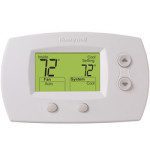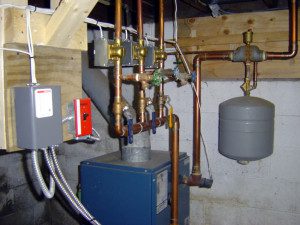What’s the right temperature for a house?
 In the summer, I keep my thermostat set at 55. Occasionally, there are fluky nights in August when it gets cold. If the house gets below 55, I’ll wake up in search of an extra blanket and I will not be a happy camper.
In the summer, I keep my thermostat set at 55. Occasionally, there are fluky nights in August when it gets cold. If the house gets below 55, I’ll wake up in search of an extra blanket and I will not be a happy camper.
When it becomes “autumn,” the temperature gets cold enough to start running the program on the thermostat because it could be below 55 degrees any time of the day or night. Autumn can happen anytime from mid-October to mid-November, depending on the year.
It made me wonder, what an ideal temperature? I tend to like it a little on the cool side, unless it is damp. So, we keep the thermostat on 61 at night and up to 67 in the daytime, when we’re home. I know some people like it warmer. What do you set your thermostat at?
My buyer-clients tend to be rather energy conscious, so they tend to notice when there is only one zone in a big house. It’s a good idea to have this in mind all year, but, more people notice this time of year.
 Zoned heating, if you operate it in a way that avoids waste, can significantly reduce your heating costs. Zoning makes it possible to avoid running bedroom heat when no one is in there all day or running living room heat while everyone is sleeping is a waste. With programmable thermostats, using zones is pretty easy.
Zoned heating, if you operate it in a way that avoids waste, can significantly reduce your heating costs. Zoning makes it possible to avoid running bedroom heat when no one is in there all day or running living room heat while everyone is sleeping is a waste. With programmable thermostats, using zones is pretty easy.
The thing my clients really hate is electric heat. Most of those systems, each room is its own zone. So, if you turn down the heat in every room you are not in, you can run the system effectively. Frequently, sellers of electrically heated places will present the bills for the past year to prove it isn’t so bad. The vast majority of my clients don’t buy it, literally.
Condo associations can have additional issues. Some associations have a common boiler in the basement that heats everyone. Is that a good thing? Most of the time, I say no. There are three problems.
1. Some units have no thermostats, so you can’t control your own heat. That can be a big negative if your unit is too cold or too hot.
2. Second, even if you have control, you are paying collectively for your neighbor’s wasteful habits.
3. And lastly, in some condo associations the air conditioning and the heat systems that are building-wide. The heat can run or the AC can run, but the system is switched to one at a time. This creates problems when the weather is turning – if you have usually hot or cold weather in the spring or fall, there could be no AC in a hot May or no heat in a cold October.